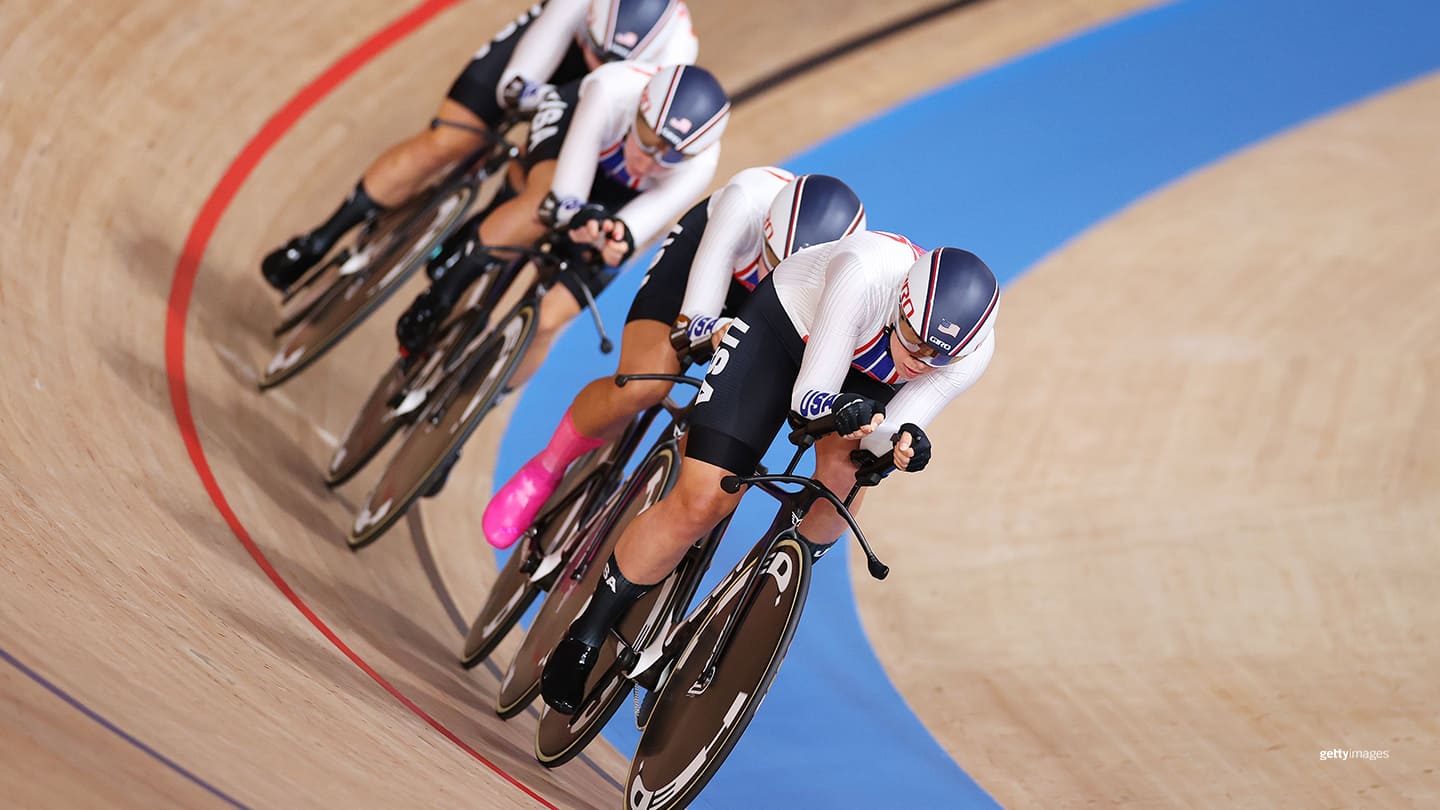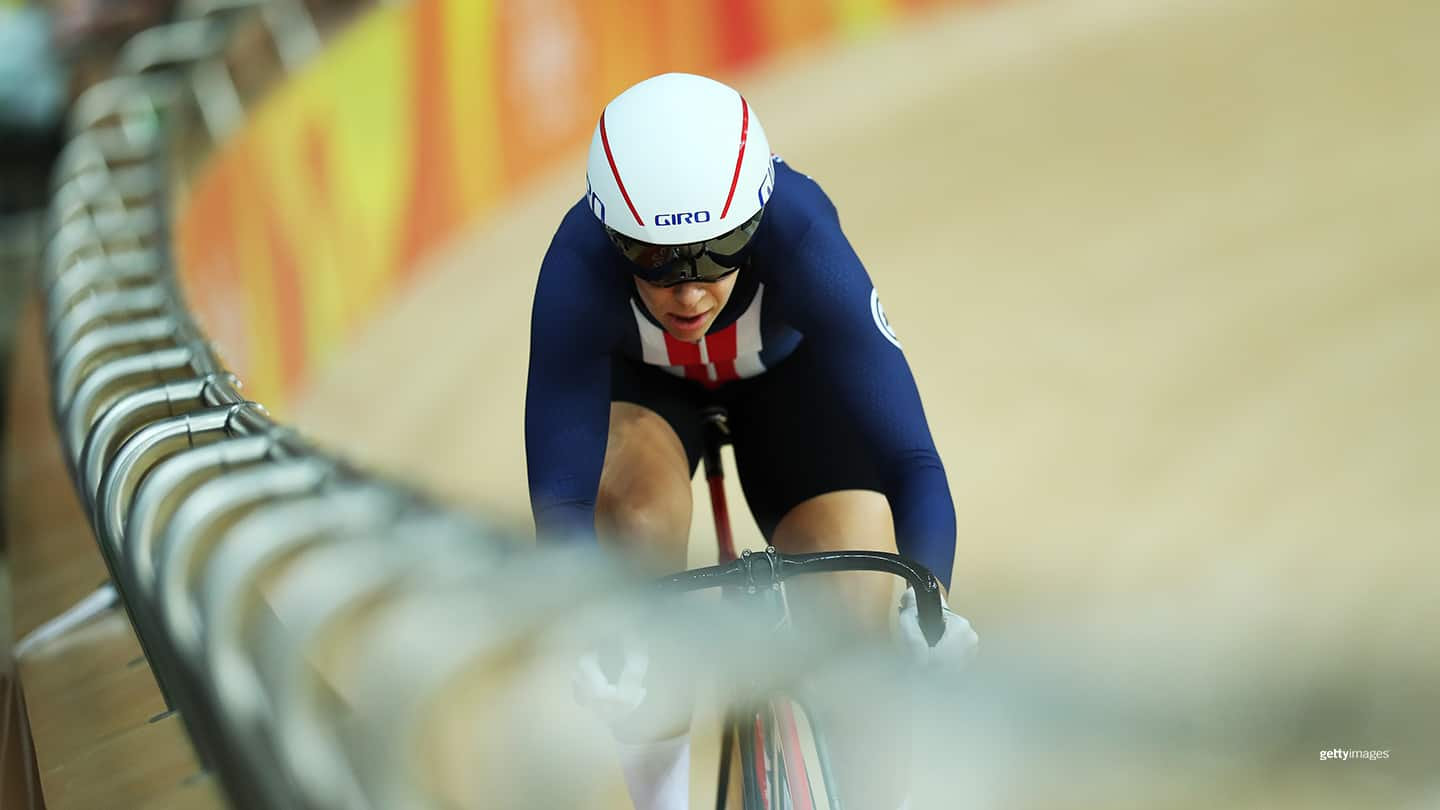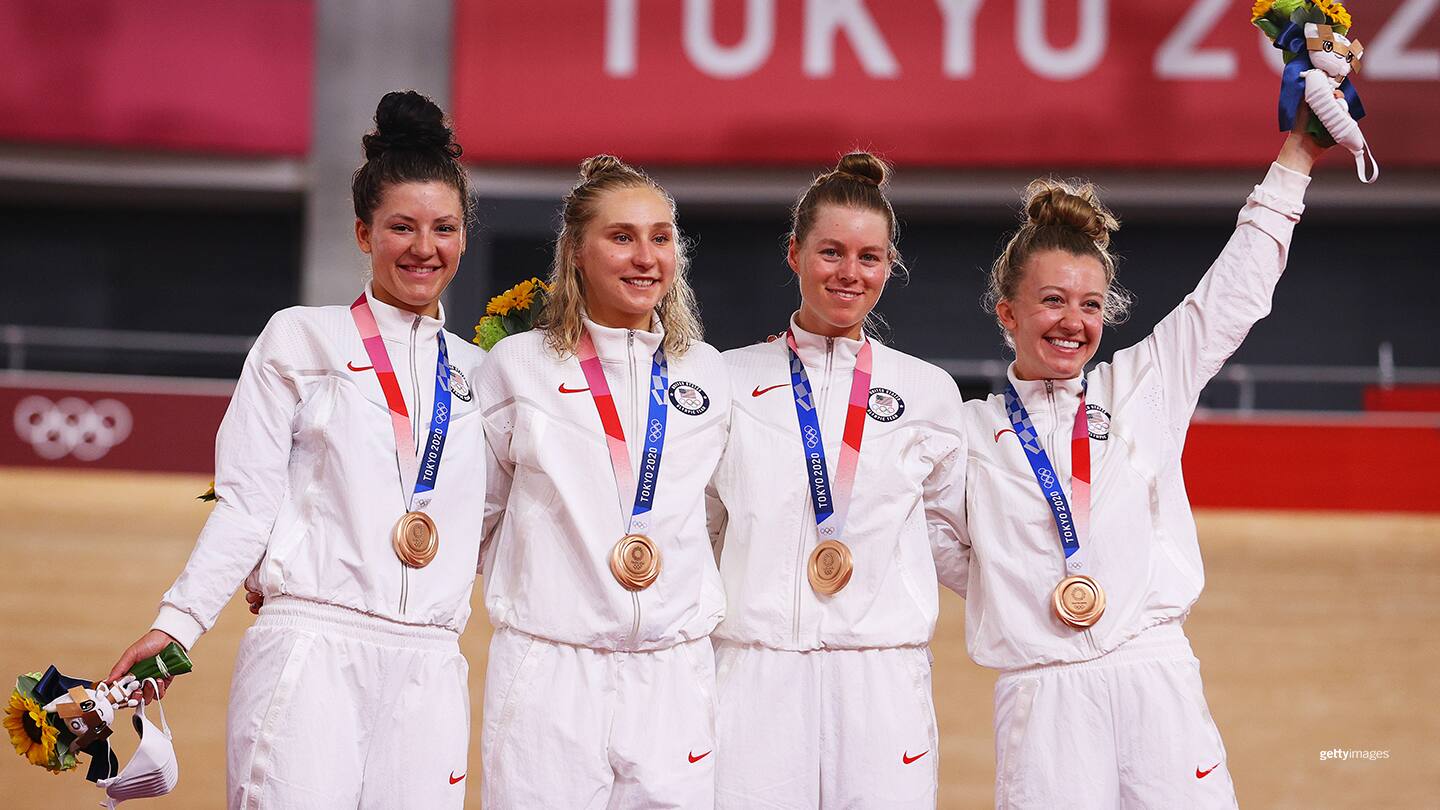
Women’s Team Pursuit Wins Third Consecutive Olympic Medal
by Peggy Shinn

Emma White and teammates sprint during the women's team pursuit first round at the Olympic Games Tokyo 2020 on Aug. 3, 2021 in Izu, Japan.
TOKYO — Yesterday, at the Izu Velodrome about 2.5 hours south of Tokyo, the U.S. women’s team pursuit squad won a bronze medal at the Olympic Games Tokyo 2020.
In this four-person race against the clock, the team of 2016 Olympic silver medalists Chloé Dygert and Jennifer Valente, plus Olympic rookies Emma White and Megan Jastrab beat Canada in the bronze-medal match-up, covering 4,000 meters on the track in 4:08.040 to Canada’s 4:10.552.
Germany faced defending Olympic champions Great Britain in the gold-medal race, with the Germans setting a world record (4:04.242) en route to winning the 2020 Olympic gold medal and Britain taking silver in 4:10.607. Although the American’s time was over two seconds faster than the Brits’, medals are awarded by pairings not times.
It was one step lower on the podium than the U.S. team pursuit squad finished at both the Olympic Games Rio 2016 and Olympic Games London 2012.
From the outside, it might seem like a let-down for the reigning world champions. But in many ways, this bronze is more valuable than silver or gold.
“We definitely came here looking for a little bit more than a bronze coming in as defending world champions,” said White. “But the rides today were just absolutely phenomenal, and we are really, really proud to pull off what we did today. … This past year has been full of a lot of struggles, and we're really proud to come away with bronze.”

Sarah Hammer competing in the women's omnium at the Olympic Games Rio 2016 on Aug. 16, 2016 in Rio de Janeiro.
The team faced a rough road to Tokyo. Veteran Sarah Hammer — a four-time Olympic medalist — had led the team to silver in both the 2012 and 2016 Games. But she had retired.
Then in March 2019, Kelly Catlin died by suicide. It shook the world of track cycling — perhaps all of cycling. Catlin was one of the main engines on the team pursuit squad, driving them to three world championship titles and the 2016 Olympic silver medal. Her death left a huge hole on the team.
Dygert and Valente were still the core of the team. At the time, Dygert was a five-time world champion on the track and two-time junior world champion on the road, and Valente was a three-time team pursuit world champion. They both had competed with Hammer and Catlin in the 2016 Rio Games, winning the silver medal.
Joining Dygert and Valente were Emma White and Lily Williams. A top road and cyclocross racer, White had finished second to Dygert in both the time trial and road race at the 2015 UCI Junior Road World Championships. Williams came to cycling relatively later in her life. A collegiate runner at Vanderbilt University, she transitioned to cycling in 2016, went pro in 2018, and first tried the track in 2019.
But they were quick learners. At the UCI Track World Championships in late February 2020, White and Williams teamed with Dygert and Valente and won the team pursuit world title in a dominating performance. Afterwards, Dygert told reporters that they had won for Catlin.
Then the Covid-19 pandemic shut down the world. Last fall, the UCI pulled off the 2020 road world championships. But disaster continued for the U.S. In the time trial, Dygert had a gruesome crash, flipping over a guard rail and slicing her quadricep muscle. Her goal had been to compete at the 2020 Olympic Games in both the road and track races. Would she recover in time?
Dygert did indeed recover in time to qualify for the Tokyo Games in both road and track. She was instrumental in leading attacks during the Olympic road race. But she struggled in the time trial, finishing seventh.
The delay to the Tokyo Games gave White and Williams more practice on the track — though no races. The whole team trained together in Colorado Springs.
“We really know our team inside and out, and each individual person and what they're capable of,” commented Valente, the team’s captain.
They also pulled in Megan Jastrab, 19, a three-time junior world champion on both the road and track. With three rounds to ride, team pursuit squads can field five riders, with one to sub in for the different heats.
The women’s team pursuit opened with qualifying rounds on Monday. Starting seventh of eight teams, the U.S. team of Dygert, Valente, White, and Williams had the advantage of watching six teams compete on the fast Izu track. Germany showed they were in Tokyo for gold by setting a new world and Olympic record at 4:07.307 — an astonishing drop from the world record set by Great Britain at the 2016 Olympic Games (4:10.236).

(L-R) Chloe Dygert, Megan Jastrab, Jennifer Valente and Emma White pose during the medal ceremony of the women's team pursuit finals at the Olympic Games Tokyo 2020 on Aug. 3, 2021 in Izu, Japan.
The British team qualified second in 4:09.022, with the U.S. qualifying third with 4:10.118. The Americans had been riding faster than the Germans but slowed toward the end. Still, the Americans set a new national record and broke the previous world record time.
“We knew records were going to fall, and [Germany] put up a very, very impressive time,” said Valente, the U.S. team captain. “We knew they were coming, and they put together a very good ride on the day, and it gives everyone across the world something to shoot for.”
In the heats on Wednesday, the U.S. raced against the British squad — a repeat of their run in Rio, except in that heat, they took on the Brits for the gold medal. The winner of the heat in Tokyo would ride in the gold-medal final against Germany, which had lowered their WR again in their heat.
In the hope of putting fresh legs into the mix, Jastrab joined the squad replacing Williams in the lineup.
Team GB vs Team USA was a close heat, but the British came out on top. Although the U.S. would now be competing for bronze rather than gold, they took consolation in their time. They rode their heat in 4:07.562.
“We’re proud of what we did out there,” said Valente. “We left everything on the track. It’s just that Team GB had a little more gas. We’re going to go in against Canada and give it our all.”
They faced Canada in the bronze-medal final and led at every split. The Americans crossed the line over 2.5 seconds ahead of the Canadians and secured their third consecutive Olympic medal in women’s team pursuit.
“There’s four of us who finished this ride, but there’s really five of us on the team that contributed to this bronze medal,” Jastrab told Velonews reporters. “Although [Lily Williams] didn’t ride the final round, she’s here, just as much of a teammate as each of us are.”
Although it was not the color medal the Americans had come to Tokyo for, the bronze felt almost as good as gold.
“Anytime you come into the Olympics, you want to go for gold,” Valente said. “Today we put together some of the best rides that we were able to, and today on the day it was bronze.”
“We're really proud of everything behind that,” she added, “and what this bronze means after a year and a half of not racing and really just coming together.”
Looking ahead at other track cycling racing to come at the Tokyo Olympic Games, Valente is a medal favorite in the women’s omnium on Sunday. Madalyn Godby competes in the women’s keirin tomorrow, along with American Gavin Hoover in the men’s omnium. Hoover and Adrian Hegvay — a lawyer and track cyclist—will compete in the men’s Madison on Saturday.
Want to follow Team USA athletes during the Olympic Games Tokyo 2020? Visit TeamUSA.org/Tokyo2020 to view the medal table, results and competition schedule.